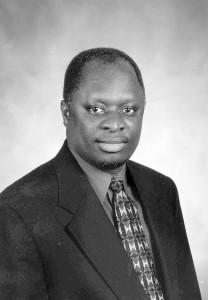 Dr. Edward Kissi, Associate Professor of History at the Department of Africana Studies at the University of South Florida, will present “Beyond the Holocaust: A Comparative Interpretation of Genocide and Mass Murder in Cambodia, Rwanda, and Darfur.”
Dr. Edward Kissi, Associate Professor of History at the Department of Africana Studies at the University of South Florida, will present “Beyond the Holocaust: A Comparative Interpretation of Genocide and Mass Murder in Cambodia, Rwanda, and Darfur.”
Monday 3 October at 7:00-9:00pm, in Ted Daigle Auditorium
This public lecture is jointly sponsored by the History Department at St. Thomas University and the Atlantic Human Rights Center. The Annual History Lecture/Vigod Memorial Lecture will offer an opportunity to reflect on interdisciplinary themes central to liberal arts education. The Vigod Memorial Lecture, named in honor of Dr. Bernie Vigod, focuses on Human Rights issues, while the Annual History Lecture explores World History themes. Dr. Kissi’s presentation will bring together both of these important topics.
For scholars of genocide, the tragedies in Cambodia, Rwanda, and Darfur are particularly instructive. The genocide in Cambodia was ideological, Rwanda’s was ethnic, and in Darfur is a convergence of factors in which desertification, government counterinsurgency and policy of “Arabism” have undermined the traditional coexistence between pastoralists and farmers. Dr. Kissi’s lecture will shed light on the need to go beyond a Holocaust-based typology for the study of contemporary genocides, as well as on the need to approach each genocide in terms of its global as well as distinctly local dimensions. A nuanced analysis of the three case studies will demonstrate a fine line between the crime of genocide and other forms of mass atrocities, a critical distinction at a time when genocide and mass murder have become interchangeable words in many circles.
Dr. Edward Kissi is historian of comparative genocide, who has published widely in the leading genocide journals and Africanist journals. His well-received book, Revolution and Genocide in Ethiopia and Cambodia, was published in 2006 by Lexington Books.


 Dr. Greg Grandin (NYU) delivered the department’s Annual History Lecture last night (March 22nd). A leading scholar of Modern Latin American history, Dr. Grandin has written widely on U.S. foreign policy, Cold War politics, human rights, and truth commissions. His acclaimed book Fordlandia (2009), about Henry Ford’s quixotic visions of progress in the Amazon jungle, was nominated for a Pulitzer Prize and a National Book Award.
Dr. Greg Grandin (NYU) delivered the department’s Annual History Lecture last night (March 22nd). A leading scholar of Modern Latin American history, Dr. Grandin has written widely on U.S. foreign policy, Cold War politics, human rights, and truth commissions. His acclaimed book Fordlandia (2009), about Henry Ford’s quixotic visions of progress in the Amazon jungle, was nominated for a Pulitzer Prize and a National Book Award.